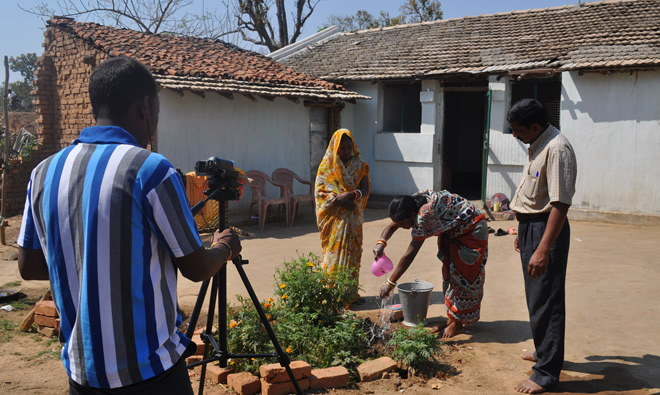
UPDATE- December 11, 2013: All ten community-led nutrition videos produced and disseminated in Keonjhar, Odisha State, India as part of the SPRING/Digital Green collaboration have been officially launched on the Digital Green website. The full collection of videos can be accessed here. This page features a collection of ten nutrition and hygiene-focused videos, as well as analytics related to the adoption of key behaviors and other data collected for each nutrition video. Data includes viewership, intention to adopt or promote practices, verified adoptions or promotion, and questions asked by members of the self-help groups during dissemination, about the video topics.
The videos focus on critical maternal, infant and child nutrition (MIYCN) behaviors and feature local women and other community members, speaking in their own language, about their individual experiences. The videos are disseminated by trained community agents through self-help groups, predominantly made up of women farmers. To stay up to date on the launch and for further information on the partnership and feasibility study, please see highlights of our Social Behavior Change Communication work.
And, don't miss this exciting webinar on December 17th, exploring the Digital Green approach in-depth with CEO Rikin Gandhi.
[VIDEO::https://www.youtube.com/embed/mkza-w_WXLQ?rel=0::full_screen_vimeo]
September 2, 2013: SPRING and Digital Green are thrilled to announce the public launch of the first set of videos developed under their collaboration and feasibility study, funded by USAID’s Global Health Bureau. The project aims to test the adaptation for nutrition of an innovative “human-mediated digital learning approach” used by Digital Green for the diffusion of improved agricultural practices. Featured videos promote high impact maternal, infant and young child nutrition (MIYCN) and hygiene practices in Odisha, India.
Under the SPRING/Digital Green model, a local NGO partner – VARRAT – working in Keonhjar District of Odisha, has produced 10 videos that showcase key nutrition and hygiene behaviors, often celebrating early adopters of these important nutrition practices. The videos are disseminated by trained community agents through self-help groups, predominantly made up of women farmers. Videos feature local women and other community members, speaking in their own language, about their individual personal experiences. The SPRING/Digital Green approach uses a “dialogue” or “reflective” process among peers, rather than a traditional nutrition education approach of outside “experts” telling clients what they should and shouldn’t do. The early adopters, who are the actual “stars” of these community videos, may also be seen as role models or “positive deviants” in their community.
[VIDEO::https://www.youtube.com/embed/_bkAbgLqoFQ?rel=0::full_screen_vimeo]
In addition to this video featured here, a library of videos produced under the collaboration can be found on the Digital Green website. This page also features analytics related to the adoption of key behaviors and other data collected for each nutrition video, available for external review. Data includes viewership, intention to adopt or promote practices, verified adoptions or promotion, and questions asked by members of the self-help groups during dissemination, about the video topics.
To stay up to date on the launch and for further information on the partnership and feasibility study, please sign up for SPRING's listserv.